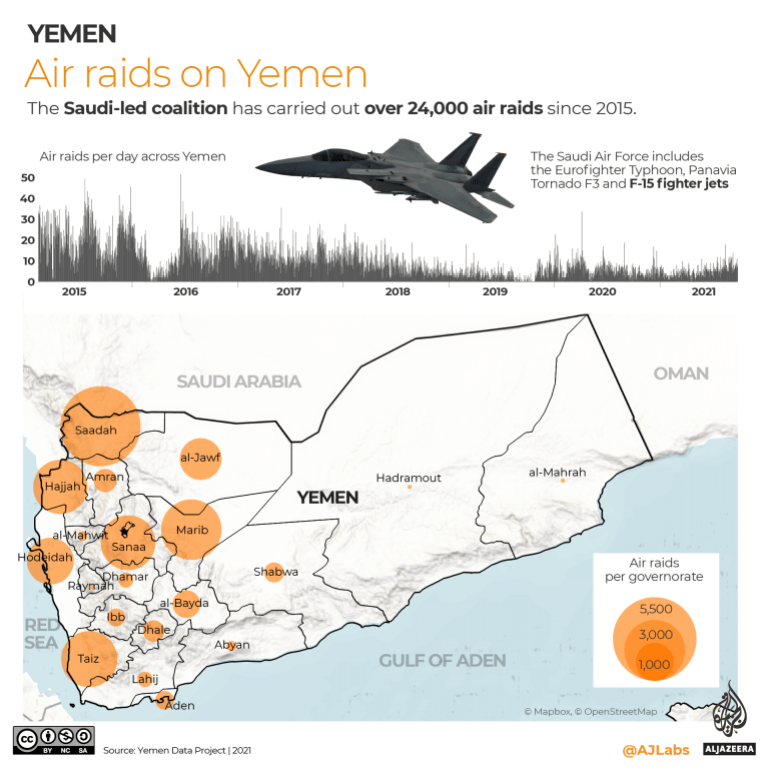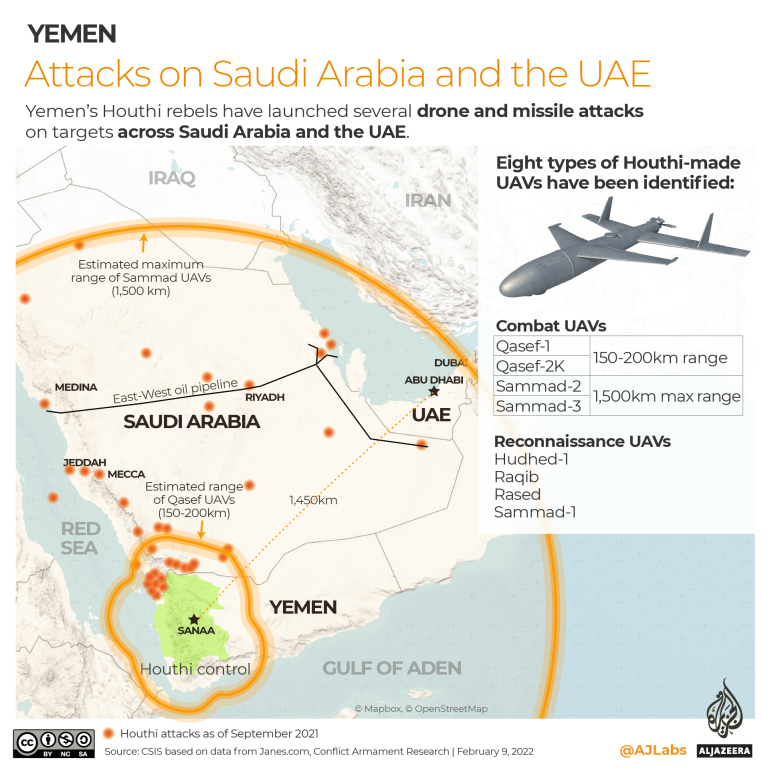How will UAE respond to Houthi attacks? | Houthis News

Sitting on her family home’s rooftop in Yemen’s capital Sanaa last week, Somaya Abdualla was enjoying an evening listening to music when the air raids arrived.
“I heard the flight hovering in the sky with a terrifying sound,” the 23-year-old filmmaker and photographer told Al Jazeera.
“Then, I saw four lights that filled the sky, and a sound so terrible that I can’t forget it. I was very afraid, my feet couldn’t carry me to go downstairs. I went to my bed shaking, I couldn’t sleep that night. ”
The air raids, carried out by the Saudi-led coalition, have been a recurring theme in Sanaa, along with other areas controlled by the Houthi rebels, killing dozens since a January 17 drone attack by the pro-Iran fighters on a fuel depot in the United Arab Emirates capital Abu Dhabi.
That attack killed three civilians and was followed up by at least two further missile attacks on targets in the UAE, including US troops based at Al-Dhafra Air Base in Abu Dhabi.
The Houthi attacks against the UAE were the first since 2018, and followed significant losses of territory for the rebels at the hands of UAE-backed forces in Yemen’s Shabwah and Marib governorates.
The offensive against the Houthis marked a shift in the UAE’s strategy in Yemen, which had, since 2018, focused on consolidating the power of groups it supports in southern Yemen, away from the front lines with the Houthis.
‘An unsafe country’
The war in Yemen has pitted the Houthis against various opponents, including the Yemeni government, which is backed by a Saudi-led coalition that includes the UAE.
“Recent Houthi advances in and around Marib were posing a growing threat to [the UAE’s] interests; this led the UAE to push the [UAE-backed] Giants Brigades to move from the west coast, where they are based, and to confront Houthi advances, ”said Thomas Juneau, an associate professor at the University of Ottawa.
While the UAE has past experience of Houthi attacks, it appears the drones and missiles fired at Abu Dhabi in January have left the authorities with a bloody nose, and perhaps an element of surprise at how brazen the attacks have been.
A period of continuous Houthi attacks would be difficult for the Emiratis to withstand, even if casualties are limited, and most projectiles are intercepted.
The UAE has prided itself on being a safe hub for business and tourism in the Middle East, a reputation that is easily damaged by images of explosions in the capital.
It is a weak point the Houthis know they can target.
“We warn foreign companies and investors to leave the Emirates,” said Yahya Saree, the Houthi military spokesman, after a January 24 Houthi attack on the UAE. “This has become an unsafe country.”
Emirati authorities appeared sensitive to that narrative taking hold, with the country’s top prosecutor threatening to prosecute people filming or posting images of attacks. That did not stop Dubai’s financial market closing down 2 percent after the January 24 attack.

A lesson learned?
Observers have paid attention to activity on the front lines between Giants Brigades forces and the Houthis to gauge whether the UAE has heeded the Houthi message.
Since the attacks on Abu Dhabi, the UAE-backed offensives in Yemen have noticeably slowed down, and a statement issued by the Giants Brigades at the end of February said its mission was accomplished, indicating its forces would not advance further for the time being.
“The UAE was careful not to lose face, but I would expect that in the future, they will try to avoid direct and large scale confrontation, as much as possible, between militias it supports and the Houthis,” Juneau said.
“It will try to continue focusing on building influence in the south, and avoid confrontation with the Houthis. But that is a difficult balance to strike. ”
Instead, the response has been largely restricted to air raids, a tactic that has become routine in the aftermath of Houthi attacks on Saudi Arabia or the UAE, but which were particularly deadly in this round of fighting.

‘No one would know’
An air raid on January 21 killed dozens of people, including many civilians, at a prison in Saada. Another air attack on the same day in Hodeidah knocked out internet service across much of Yemen for four days.
For Yemenis such as Abdualla, that meant being disconnected from the world, and one of the few ways to mentally escape the nearly seven-year conflict.
She has already lost her 16-year-old brother, Alhasan, who died fighting on the front lines in 2020.
“The worst thing was when we heard the air strikes, I couldn’t go online to see what places were hit, and how many victims there were,” she said.
“I feel that the world abandoned us seven years ago, but with the interruption of the internet, this feeling has been confirmed to me. I was very afraid that I would die and no one would know. ”



